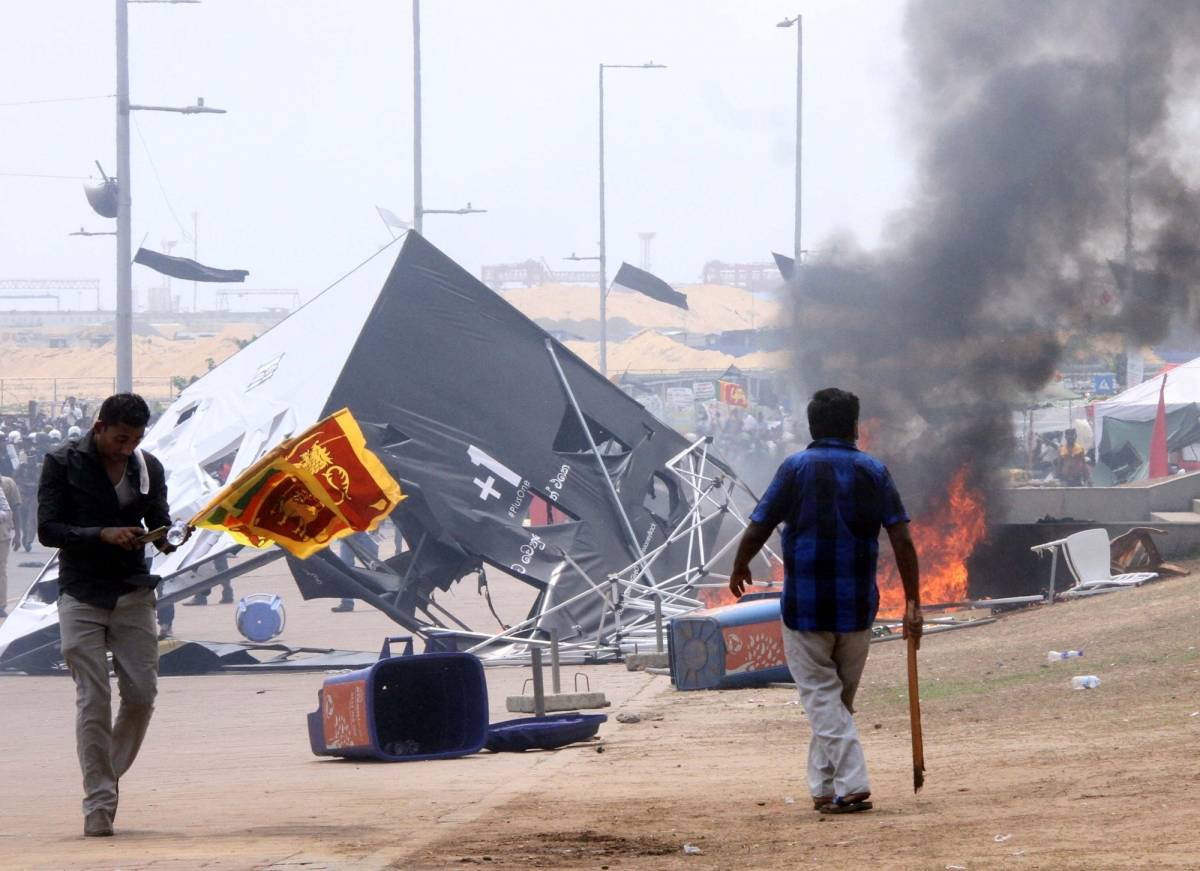At least five people, including an MP, were killed in Sri Lanka, with over 200 others injured in the wake of the violence in the island nation, which also led to a number of houses belonging to resigned PM Mahinda Rajapaksa and other politicians, being torched, reports Susitha Fernando and Arul Louis
A Sri Lankan parliamentarian of the ruling party of the Rajapakasas and two others were found dead on Monday in violent clashes between anti- and pro-government protesters in the country.
Amarakeerthi Athukorala, 57, a Sri Lanka Podujana Peramuna (SLPP) MP from the Polonnaruwa district, was surrounded by anti-government groups at the north western town of Nittambuwa, the police said.
The people said that gunfire came from his SUV, and when the angry mobs toppled the car, he fled and took refuge in a building and committed suicide by pulling his own revolver.
By the time he killed himself, thousands of people had surrounded the building.
Later, the lawmaker and his personal security officer were found dead, the police said.
Moreover, a 27-year-old man also died in the shooting, according to the News First website.
Meanwhile, the law-and-order situation went out of hand as properties owned by many other SLPP politicians were attacked following the violent attacks on peaceful protestors in Colombo’s GotaGoGama’ and MynaGoGama’ protests sites.
The offices of former minister Johnston Fernando in Kurunegala and Colombo were attacked by angry crowds. His taverns were also set on fire.
The residence of former minister Nimal Lanza was attacked while Mayor Saman Lal Fernando’s residence was set on fire.
Ruling party Trade Leader Mahinda Kahandagamage’s residence in Colombo was also attacked. He was seen leading the charge on the two protest sites earlier in the day, the report said.
The whole country erupted in violence after mobs supporting Mahinda Rajapaksa, who resigned as the Prime Minister, attacked peaceful protesters.
The public turned their wrath on the pro-Rajapaksa supporters as they were leaving the capital back home.
Their vehicles were stopped and attacked in most towns.
Mahinda Rajapaksa, 76, resigned hours after his supporters attacked anti-government protesters outside President Gotabaya Rajapaksa’s office, leaving at least 174 people injured and prompting authorities to impose a nationwide curfew and deploy army troops in the capital.
Sri Lanka is currently in the throes of unprecedented economic turmoil since its independence from Britain in 1948. The crisis is caused in part by a lack of foreign currency, which has meant that the country cannot afford to pay for imports of staple foods and fuel, leading to acute shortages and very high prices.
Thousands of demonstrators have hit the streets across Sri Lanka since April 9 seeking resignation of President Gotabaya and Prime Minister Mahinda, as the government ran out of money for vital imports; prices of essential commodities have skyrocketed and there are acute shortages in fuel, medicines and electricity supply.
Guterres calls for dialogue
UN Secretary General Antonio Guterres wants Sri Lankans to find a solution through dialogue to the crisis in their country, whose Prime Minister Mahinda Rajapaksa resigned amid violent clashes spurred by an economic crisis, his Deputy Spokesperson Farhan Haq said on Monday.
“We continue to encourage all Sri Lankan stakeholders to find a solution to the current challenges through dialogue and with the interests of the country and the people in mind,” Haq said.

“We’ve also been concerned about the recent violence against peaceful protesters, and we urge calm and restraint, as well as respect for democratic rights, including the right… the freedom of expression and the right to peaceful assembly,” Haq said.
A member of parliament from the ruling party, Amarakeerthi Athukorala, was found dead after he fired into a crowd of protesters blocking his way and fled the place.
Sri Lanka is in dire economic straits caused by foreign exchange shortages. It has sought financial arrangements with India and Bangladesh to import vital food supplies and oil to make up for shortages that have fuelled the protests.

Leave a Reply